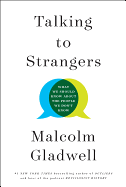
"Prejudice and incompetence go a long way toward explaining social dysfunction in America. But what do you do with either of those diagnoses aside from vowing, in full earnestness, to try harder next time?"
This is the question that author and journalist Malcolm Gladwell (The Tipping Point) strives to answer in Talking to Strangers. It's a slightly anticipatory title, given that Gladwell's focus isn't on the act of conversation with someone perceived as different, but on the common psychological stumbling blocks that could lead to--and indeed, have resulted in--misunderstandings and misperceptions on a grand scale. Gladwell demonstrates that having this awareness is imperative to dealing with a world that is increasingly full of encounters with people who may not share one's perspectives, beliefs or values.
Most of the stories in Talking to Strangers involve familiar, high-profile cases, and Gladwell ties these seemingly disparate incidents together to demonstrate that the human brain tends to "default to truth"--an instinctual, intrinsic belief that our interactions with people are genuine and honest. It's counter-intuitive to the mistaken perception that people are automatically distrusting and cynical.
Like much of Gladwell's work, Talking to Strangers carries relevance for the contemporary moment. American discourse is full of anger, distrust and hostility. While people's preferred interactions are with those we perceive as sharing similar viewpoints, that is an unrealistic expectation today. By enlightening readers about the inner workings of the mind when encountering someone who appears different, Gladwell offers a roadmap for more positive conversations, engagement and interaction. --Melissa Firman, writer at melissafirman.com

